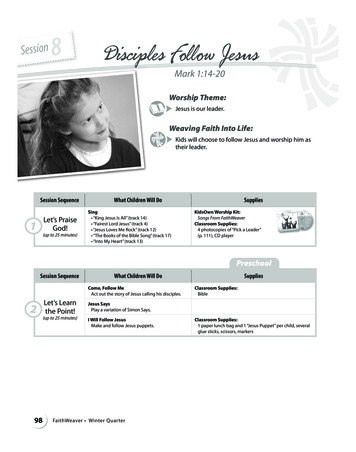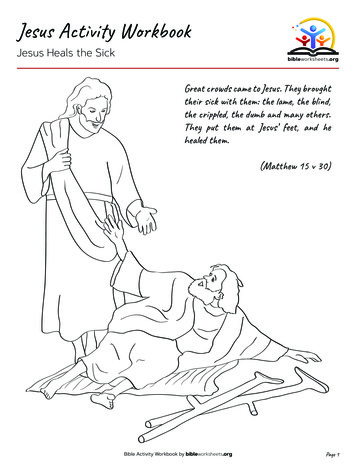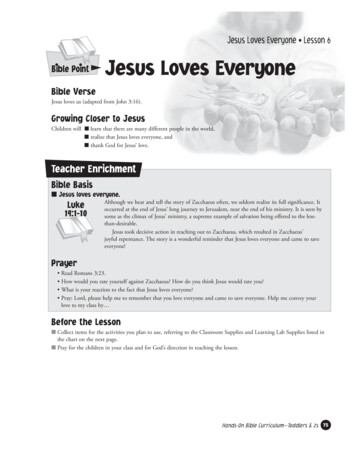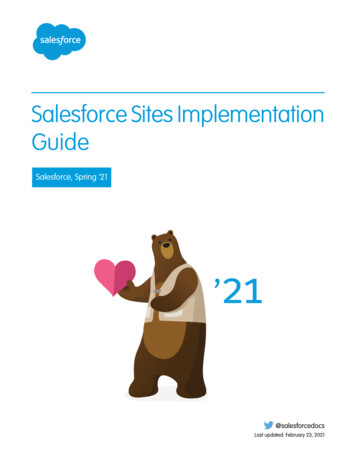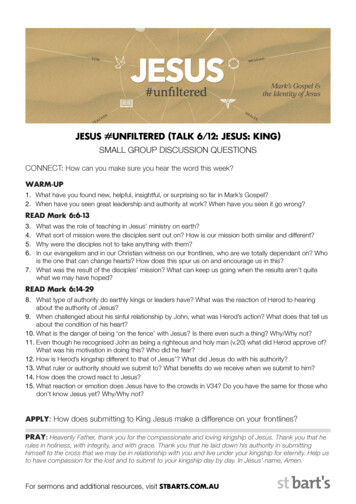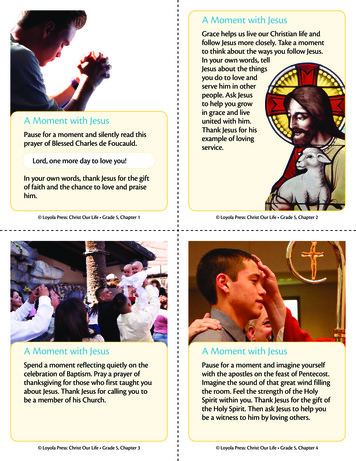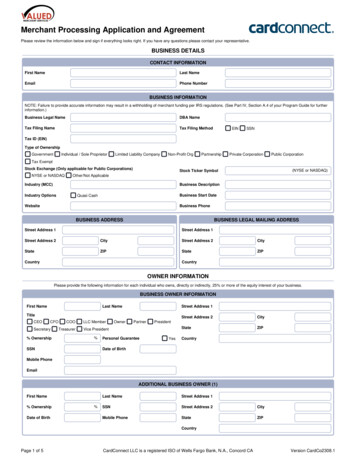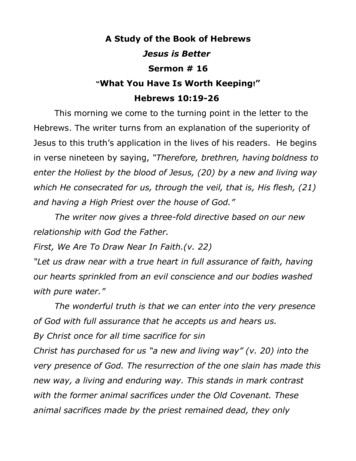
Transcription
A Study of the Book of HebrewsJesus is BetterSermon # 16“WhatYou Have Is Worth Keeping!”Hebrews 10:19-26This morning we come to the turning point in the letter to theHebrews. The writer turns from an explanation of the superiority ofJesus to this truth’s application in the lives of his readers. He beginsin verse nineteen by saying, ―Therefore, brethren, having boldness toenter the Holiest by the blood of Jesus, (20) by a new and living waywhich He consecrated for us, through the veil, that is, His flesh, (21)and having a High Priest over the house of God.‖The writer now gives a three-fold directive based on our newrelationship with God the Father.First, We Are To Draw Near In Faith.(v. 22)―Let us draw near with a true heart in full assurance of faith, havingour hearts sprinkled from an evil conscience and our bodies washedwith pure water.‖The wonderful truth is that we can enter into the very presenceof God with full assurance that he accepts us and hears us.By Christ once for all time sacrifice for sinChrist has purchased for us ―a new and living way‖ (v. 20) into thevery presence of God. The resurrection of the one slain has made thisnew way, a living and enduring way. This stands in mark contrastwith the former animal sacrifices under the Old Covenant. Theseanimal sacrifices made by the priest remained dead, they only
temporarily covered sin. We are able, and indeed are invited to walkinto the presence of Almighty God on the merit of the risen, and livingChrist.In verse twenty-two we are told how we are to enter into thepresence of God.We are to enter with a clear conscience, for the first time in theirlives their guilt was completely gone. The writer says therefore thatthey should enter into God presence with a ―true heart‖ - the wordtranslated ―true‖ here means ‗sincere.‖ That is with no mixed motivesor divided loyalties. It is the opposite of what we some timesexperience in our everyday lives. We have all met people, who whenthey are introduced keep talking and smiling at us but all the willthere eyes are roaming looking at other people and other things.They really are not interested in us at all. That is exactly the oppositeof what we are told that God expects from us!We are not only invited to Draw Near In Faith but Second, We Are To Hold Fast In Hope (v. 23)―Let us hold fast the confession of our hope without wavering, for Hewho promised is faithful.‖So many people in our world today live without any real hope. Infact they are not living so much as just surviving. They manage toput one foot in front of the other by depending on some unfoundedworldly “hope.” By that I mean that they are “hoping” that the futurewill bring something different into their lives. They live hoping for abrighter tomorrow, hoping for a change, looking for someone new in
their lives to change every thing. But their hope is not founded ontruth, but rather wishful thinking.But as Christians our hope has substance. When the author hererefers to “the confession of our hope” he is referring back to what hesaid in 6:19. ―This hope we have as an anchor of the soul, both sureand steadfast, and which enters the Presence behind the veil.‖ Weunderstand that an anchor grabs onto the floor of the ocean andholds the vessel securely. But the shifting sands of this world offernothing to secure us for eternity. So our anchor does not go down tothe ocean below, but upward and is anchored in God’s presence inHeaven.We are not only to Hold Fast In Hope but Third, We Are to Encourage In Love (vv. 24-25)―And let us consider one another in order to stir up love and goodworks.‖Consider means “to observe,” “to contemplate,” or “to have anintelligent insight into.”The idea here is that we are ―to spur or stir up‖ one another togood works. The King James Version captures the strength of thisverb (paroxusmos) by translating it ―provoke.‖ Normally speakingthis is not a pleasant word – but here has the pleasant connotation ofprodding our brothers and sisters to good deeds. The Greek wordspeaks forcefully of the tremendous impact believers can have oneach other. In Order That We Stir Each Other Up (To Do Good).
I think that it can truly be said that we as Christians often stir eachother up, but it is not always to good deeds. Accomplished Through Frequent Assembly (v. 25a)―not forsaking the assembling of ourselves together, as is the mannerof some ‖People have a thousand reasons or should I say excuses for whythey do not attend church more regularly. In the church to whom thisletter is written, attendance perhaps had been affected bypersecution. That, however is not one of our problems.Perhaps you have heard “The Psalm of Summer.”“Now it came to pass that spring turned to summer again.God’s people raised their voices and said:“Recreation is my shepherd, I shall not stay at home;He maketh me to lie down in a sleeping bag;He leadeth me down the Interstate each weekend.He restoreth my suntan; He leadeth me to State Parks for comfort’s sake.Even though I stray on the Lord’s Day,I will fear no reprimand, for Thou art with me;my rod and reel they comfort me.I anointest my skin with oil, my gas tank runneth over;Surely my trailer shall follow me all the weekends this summer,and I shall return to the House of the Lord this fall.”But then it is hunting season and that’s another psalm.”[Source unknown -www.bible.org/illus/Hebrews]But we have a number of sound reasons for not giving in to the urge to not attendchurch. I just want to share a couple with you this morning.
First, we meet with Christ in a special way when we gather for corporateworship. Kent Hughes says, “It is true that a person does not have to go to churchto be a Christian. He does not have to go home to be married either. But in bothcases if he does not, he will have a very poor relationship.” [R. Kent Hughes. Hebrews: AnAnchor For the Soul. Vol 2 (Wheaton, ILL: Crossway Books, 1993) p. 34] Secondly, Corporate Worship give us an opportunity to praise God that we do notordinary have in solitude.Perhaps you have heard of the man who refused to go tochurch! “When a pastor asked him why, he answered, ―I don‘t go tochurch because every time I do they throw something at me.‖ ―Whatdo you mean?‖ the preacher inquired. The man went on to explain.―When I was just a child and my parents took me to church, theminister threw water on me. When I got married, the weddingceremony took place in a church, and they threw rice at me.‖Hearing this, the pastor quickly responded, ―And if you don‘tstart going to church soon, the next time you do I‘m afraid they‘llthrow DIRT on you!‖Sadly, this describes the situation for many people. As far aschurch attendance is concerned, for some they go to church twice intheir lives - to be Married, and to be Buried—and that‘s about all. Foran obedient child of God, however, that will never do. [R.W.D. - Our Daily Bread,October 28 - www.bible.org/illus/Hebrews] With the Result That We Encourage One Another. (v. 25b)― but exhorting one another, and so much the more as you see theDay approaching.‖The late Bishop Fulton Sheen once entered a greasy-spoonrestaurant for breakfast, and when the waitress, groggy and
disinterested, took his order, he replied, ―Bring me some ham andeggs and a few kind words.‖ When she returned fifteen minutes later,she set the food before him and said, ―There.‖ ―What about the kindwords?‖ The server looked him over a moment, them replied, ―I‘dadvise you not to eat them eggs!‖[R. J. Morgan. Nelson's Complete Book Of Stories,Illustrations, And Quotes (electronic ed. -2000) (Nashville: Thomas Nelson Pub.)]Yet there is amazing power in an encouraging word. You and Ihave the power to change a life with a kind and encouraging word.The fact is that encouragement is a Christian duty.William Barclay says, ―One of the highest of human duties is theduty of encouragement .It is easy to laugh at men‘s ideals; it is easyto pour cold water on their enthusiasm; it is easy to discourageothers. The world is full of discouragers. We have a Christian duty toencourage one another. Many a time a word of praise or thanks orappreciation or cheer has kept a man on his feet. Blessed is the manwho speaks such a word.‖[William Barclay. The Letter to the Hebrews.]ConclusionImagine that there is a person standing in front of you strugglingwith several large packages. You may know them, or you might not.It could be a friend or a stranger Perhaps it's someone you seeeveryday, or it could be someone you'll only meet once.Imagine then there before you struggling with several largepackages. They've got more than they can carry. The burden is toomuch for them to bear alone. You see them straining and hurting andaching from the weight of the packages.Now, what would you do?Think about it, you're at Wal-Mart or the grocery store and
you're standing there with nothing in your own hands. And all of asudden you notice this person in front of you who is just about todrop their packages because they have more than they can handle.What is your first thought?Of course, you have the natural urge to give them a hand. Youwouldn't just stand there and watch them struggle and drop thingswhen you could easily help them out.You know, you really don't have to use your imagination unlessyou want to. You can see it in living color every single day of yourlife.You see, there ARE those in your pathway, standing right therein front of you, who are struggling with more than they can carry. Oh,it may not be groceries or house-hold items from the departmentstore, but it is a very real burden that weighs them down just thesame.Maybe it's a divorce they are going through. Or, it might be anillness. It could be a relationship problem, a difficult decision, asituation at work, or they could just be having a bad day. There areall kinds of things that weigh us down. Things that we struggle with.Things that leave us straining and hurting and aching from the weightthat is upon us. Perhaps it is just that they are find themselves insituation where there is no one to turn to for encouragement, no onewho understands the way they feel.Someone who is carrying too many packages will be in front ofyou today. You can count on it. Will you notice them? It might be afriend or a stranger, someone you are close to or someone you barely
know, someone you see everyday or someone you'll only meet once.And they'll be standing there struggling under the weight.What is your first thought? Will you reach out and give them ahand? Will you do what you can to help meet the need? Will you offera listening ear or a shoulder to cry on? Will you be someone to helpbear the burden in whatever way that you can?You can encourage those who have been a blessing to you byletting them know that you appreciate what they have done. Thereare countless people in every walk of life who are never recognized orencouraged no matter how hard they try. Often that lack ofappreciation is what will make or break them.You can encourage your mechanic by telling him how you appreciatehaving someone you can trust. You can encourage your wife whenyou tell her how much you appreciate all that she does. You canencourage your children by telling them how much they bring joy toyour heart. To encourage is to strengthen, to encourage is to refresh,to encourage is to provoke good deeds in others. Encouragesomeone today!
Christ has purchased for us ―a new and living way‖ (v. 20) into the very presence of God. The resurrection of the one slain has made this new way, a living and enduring way. This stands in mark contrast with the former animal sacrifices under the Old Covenant. These animal sacrifices made by the priest remained dead, they only

